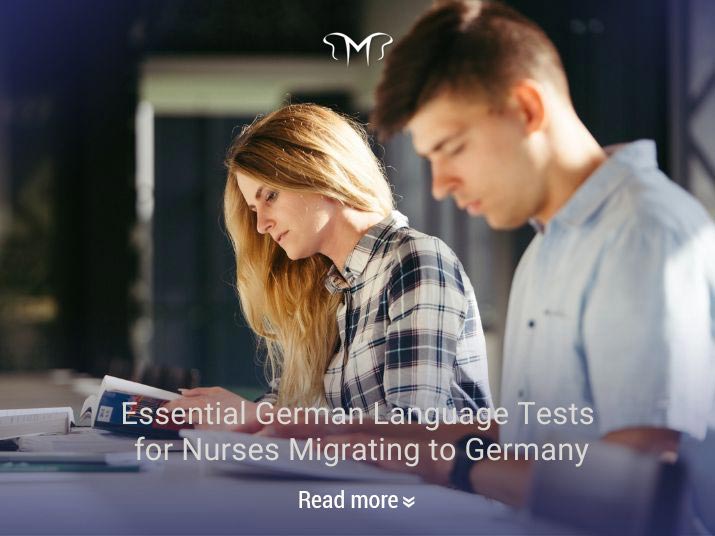
Essential German Language Tests for Nurses Migrating to Germany
In recent years, the nursing profession in many developed countries, such as Germany, has been regarded as a career with promising prospects and ideal income. This has encouraged many foreign nurses to consider migrating to Germany. If you, as a nurse, are also planning to migrate to Germany, you must first become familiar with the conditions and requirements for nurse migration to Germany, the benefits and facilities available to nurses after arriving in Germany, the necessary and essential costs, the required documents, language tests for nurses migrating to Germany, language requirements for nurses in Germany, as well as the cost of living in the country and the income of the nursing profession in Germany. In this article from Monarch Immigration Institute’s website, the most specialized immigration agency for nurse migration to Germany, we aim to provide information about the required language tests for nurses who wish to migrate to Germany. Stay with us until the end of this article.
Introduction to the German Language
Before diving into the required language tests for nurses migrating to Germany, let’s first have a brief introduction to the German language. German is a European language predominantly spoken in Central Europe. It is also considered one of the world's major languages and is the native language of over 95 million people. Additionally, German is the second most widely used scientific language, as a significant number of scientific articles written online are in German.
Introduction to Different Language Exams Required for Nurses Migrating to Germany
German language exams are quite diverse, and individuals participate in these exams based on their specific goals. Anyone planning to migrate to a foreign country must learn the language of that country according to their purpose. Therefore, German language exams are essential and unavoidable for nurses migrating to Germany. Nurses with a German language certificate approved by the embassy increase their chances of obtaining a visa. In this article from the Monarch Immigration Institute’s website, we will introduce the various language exams required for nurses migrating to Germany. Stay with us until the end of this article.
Goethe Language Exam
One of the required language exams for nurses migrating to Germany is the Goethe exam. This test covers various skills, including comprehension, writing, reading, listening, and speaking. The Goethe exam ranges from A1 to C2 levels. The minimum age requirement for this exam is 16 years, and for obtaining the C2 certificate, you must be at least 18 years old. This certification is valid permanently, but if more than a year has passed since receiving it, the destination country might not accept it, requiring you to retake the exam. The cost of the Goethe exam varies depending on the level and the applicant’s age.
OSD Language Exam
The OSD exam is another language test required for nurses migrating to Germany. OSD exams are internationally recognized and designed according to the Common European Framework of Reference for Languages (CEFR), covering levels A1 to C2. The OSD exam assesses skills in writing, reading, listening, and speaking. Like the Goethe exam, the OSD certification is also valid permanently, and the costs depend on your language level and the institution where you register.
DSH Language Exam
For nurses planning to migrate to Germany, the DSH exam is another essential language test. The DSH exam is specific to Germany and is only administered in the country’s universities. It consists of four sections: comprehension, listening, writing, and speaking. The oral part of the exam takes place seven days after passing the written part. To participate in the oral exam, you must first pass the written test. A score of 57 to 67 corresponds to DSH1, 67 to 81 corresponds to DSH2, and above 82 corresponds to DSH3. Most German institutions require a DSH2 or DSH3 certificate.
TELC Language Exam
The TELC language exam offers a wide range of levels, from A1 to C2. It is another important language test for nurses migrating to Germany, helping nurses demonstrate their language skills in both work and non-work environments. People of various age groups, including children and teenagers, can also take this exam. TELC certification is valid permanently and is recognized in all German-speaking countries. The exam is scored out of 300, with a minimum passing score of 60. One unique feature of TELC is its dual-level exam, where candidates are evaluated at two levels. In Iran, this exam is conducted by the National Organization for Educational Testing. For studying and language requirements for nurses migrating to Germany, B1 and B2 levels are sufficient. Therefore, individuals choose the appropriate exam based on their conditions, budget, and job opportunities in Germany.
TestDaF Exam
TestDaF is a recognized German language test designed and administered by Germany. The scoring of this exam is also carried out by the country itself. Like other exams, TestDaF consists of four sections: reading, writing, speaking, and listening. The final score is calculated based on the individual scores of each section, which are scored independently out of 5 points. For nursing migration and German universities, a score of 4 is required.
ECL Language Exam
The ECL exam was designed in 1992 by a group of European Union members, along with LINGUA and ERASMUS, to assess and evaluate the languages of EU member countries based on unified criteria. ECL is a recognized German language exam approved by the embassy and German universities, and it is also conducted in Iran. Nurses planning to migrate to Germany require a consistent, standard, and recognized language exam to achieve their goals. This exam is now administered in EU member countries by accredited universities. It covers languages such as English, French, German, Polish, Italian, Romanian, Bulgarian, Russian, Spanish, Hebrew, Serbian, Slovak, Croatian, and Czech.

Language Level Assessment for Nurses' Migration to Germany
According to the framework established by the Common European Framework of Reference for Languages (CEFR), the German language levels are as follows:
-
A1 and A2 levels: Cover basic knowledge of the German language.
-
B1 and B2 levels: Represent the ability to use a combination of speaking, listening, writing, and comprehension skills.
-
C1 and C2 levels: Are the highest levels of German proficiency, equivalent to native language fluency.

Benefits of Language Tests Required for Nurses' Migration to Germany
If you plan to migrate as a nurse to Germany, you must have at least an embassy-approved language certificate to apply for a work visa. Having a language certificate offers many benefits, not only for embassy procedures but also upon entering the destination country. Here are some advantages of the language tests required for nurses migrating to Germany:
-
A language certificate enhances your resume, increasing your chances of obtaining a visa.
-
You can communicate easily and without stress with patients, colleagues, and friends in the destination country.
-
You can make more friends.
-
You can travel comfortably to German-speaking countries like Austria.
-
With a language certificate, you won’t need to pay extra fees for language learning in the destination country.
-
Mastering the German language will make your life in the country much easier.
Drawbacks of Language Tests Required for Nurses' Migration to Germany
One of the disadvantages of migrating as a nurse to Germany is the difficulty of the required language tests. German is considered more challenging to learn compared to other languages. The complexity of its grammar rules and numerous details make it difficult for many individuals to learn and achieve higher language certificates.

Conclusion
Nurses intending to migrate to Germany should remember that language tests are one of the most important requirements to achieve their goal. Therefore, any nurse who plans to move to Germany must provide at least a relevant language certificate as a critical step in entering the destination country. Learning and obtaining a German language certificate should be one of the key elements of your migration plan. In this article from the Monarch Immigration Institute’s website, we examined and introduced the language tests required for nurses migrating to Germany, the levels of these tests, and the advantages and disadvantages of learning German. It was also noted that a German language certificate is one of the most important factors for nurses migrating to Germany. Monarch Immigration Institute is the most specialized institute for the migration of nurses and medical staff to Germany. If you are a nurse looking to migrate to Germany, you can use this institute’s free services for your migration process.
FAQs
-
Is a language certificate required for nurses to migrate to Germany? Yes, a language certificate is one of the most important factors for nurses migrating to Germany.
-
What are the disadvantages of the language tests required for nurses to migrate to Germany? The complexity and difficulty of German grammar rules are among the disadvantages of the essential language tests for nurses migrating to Germany.
-
What are some examples of language tests required for nurses to migrate to Germany? Goethe Test, OSD Test, ECL Test, Test DAF, and others are examples of language certificates needed for nurses migrating to Germany.


